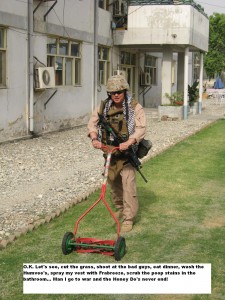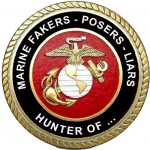Second Letter from the Front
January 6th, 2008 Posted in The SandGram v1.0Here is the second letter from Brooks. Hope you enjoy the update. More to come.
S/F Taco
Dear Family and Friends:
With six weeks under my belt now, I am beginning to feel at ease with the surroundings and the routine of work and daily life here, which, when we are not working, is mostly filled with sleep, exercise, trying not to eat too much chow in the dining facility, and waiting for helicopters. Lest anyone thinks the two hour advance arrivals in the States are unknown in a combat zone, forget it. Reservations for a seat on a flight must be made exactly four days in advance and you must check in at the air facility 2 hours before your departure time. The only positive is no TSA checkpoints, since everyone here is already armed. Most flights out of my camp and back to it are done at night, so this usually means sitting around a dusty plywood hut for two hours or more until around midnight, when the flight arrives and the wind from the rotors buffets the thin plywood walls. A Marine with a roster and a fluorescent blue chemlight ushers the passengers outside and we follow in single file to the landing zone, clad in our flak jackets and helmets, and lugging backpacks and rucksacks through the hot rotor wash, blowing sand, and gravel. Once aboard, bathed in dim green light, we sit knee to knee inside the rumbling fuselage, smelling exhaust fumes wafting through the narrow compartment. The waiting can last a few minutes, or if you are unlucky, there is a lengthy delay as the aircrews and ground crews work to load or unload cargo (sound familiar), which can take longer than you would think since it is being done in the dark, with a military forklift, while the helicopters are running. Last night, when we departed a remote airbase, the helo fired off a solitary red flare, probably as a precaution, that was intended to distract man portable surface to air missiles. I don’t know if there was a legitimate threat below trying to shoot us down, but when you are sitting near the rear of the aircraft, as I was, peering out into the blackness beyond the edge of the ramp, and you hear a loud pop, followed by burst of red light, it certainly gets your attention for a second.
Since my first update, I have ridden on nearly a dozen helicopters and visited several cities, military bases/camps, and Joint Security Stations (police precincts) in Al Anbar Province. My focus has been on what is termed “Transition”, which, for the military, is the training, advising, and equipping of the Iraqi Security Forces, their Army, Police, and to a lesser extent, their newly formed Highway Patrol. Transition, though, is more than just training a military and a police force; it consists of several pillars or elements that must be interconnected and interdependent to fully function as one. These elements are: Rule of Law, Security, Communication, Governance, and Economics. In order to get all of these elements of Transition to work is a complicated, sometimes rewarding, and frequently frustrating process, involving military civila affairs teams, US State Department Provincial Reconstruction Teams, US Agency for International Development, law enforcement advisors, and instructors on judicial process and municipal management. The overall goal of Transition is to move the Iraqis to a point where they have become relatively self sufficient and reasonably capable of providing security, stability, and the broad array of basic services at the local, regional, and national levels. There will be differing and uneven progress in all these areas, imperfect solutions at best, but if we and the Iraqis can build on the trust that has been established so far, their formal government institutions and their age old tribal organizations will find a way to work together and function for the betterment of their leaders and their constituents.
For the Marines, the Security element of Transition, especially the training and advising piece, can be somewhat counter intuitive for the American military mind. Our traditions and our ethos are steeped in the institutional practice of empowering young leaders and solving problems at the lowest levels. Our ranks are replete with Type A, problem solvers and aggressive, smart young enlisted who want to “fix” and change things, in this case the Iraqis and their seemingly bad habits. But the Iraqis do not adhere or subscribe to a Western military mindset. Arab militaries, for the most part, do not have any tradition of expecting their Corporals and Sergeants to take decisions; that is left to the Captains and Majors. However, the Iraqi soldier, or “jundi” is desirous of a challenge, eager to learn and show he is competent and capable, and their officers are, for the most part, quite seasoned. We Americans often look at their Army and Police with a very critical eye and see their shortcomings compared to our capabilities as deficiencies we must address and indeed correct before we can depart and deem our mission a success. But our trainers and advisors must fight this urge to try and remake the Iraqis in our image, for the longer we persist with this line of thinking, the more the Iraqis will lean on us and expect more from us. We are, as one departing colonel told me, “advisors, not providers” and the sooner we embrace that philosophy, the sooner the Iraqis will begin to solve their problems in their own time and in their own way. They are already doing this in many areas, we are simply here to ensure they make progress, but over time, that progress will have to be defined more by them, and less by us.
For those of you wondering where and when this relationship ends, it won’t, at least for another twenty years, perhaps much longer. We have made a long term moral, financial, and military commitment to the Iraqis and we are not going to renege on that commitment, regardless of the political rhetoric in Washington DC or on the campaign trail. Our degree of involvement and numbers of troops will decline in the years ahead, but it is obvious to me that we will have troops working alongside the Iraqis, just as we have the South Koreans and the Germans, for at least another generation. By that time, it is my hope that the young barefooted Iraqi boys, who passed me by the other day, pushing carts to Fallujah, will have had an opportunity to go to school, find an honorable way to earn a living, and raise their families in peace.
Semper Fidelis,
Brooks D.Tucker
Major, USMCR
Tags: The SandGram v1.0





